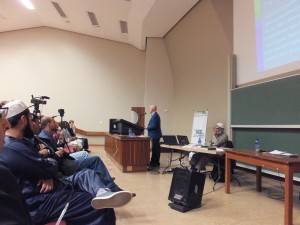The fundamental misunderstanding of Saifullah and Azmy regarding the science of textual criticism vitiated any serious challenge to be offered by the entirety of their article (we respond to it, however, due to the fact that most evangelicals are utterly unfamiliar with the most basic elements of the field as well, and hence might find the willy-nilly citation of obscure sources impressive or challenging). S&A note that the standard sources of modern English Bible translations are the Biblia Hebraica Stuttgartensia for the Hebrew text and the Nestle-Aland Greek text (currently 27th ed., printed, with the 28th in the works) for the New Testament. They add that these texts are based on “editorial judgment.” That is true: the main text is the result of the editorial judgment of the committees. But the texts provide the data at the bottom of the page when there is a serious textual variant. Once again we point out the difference between Uthmann’s making the final decision on variant readings (decisions we cannot examine or test today) and the provision of a full spectrum of information so that all can examine the reasoning of the committee in its making its decisions regarding variants. Which would you rather have? “Trust us, we did it right the first time—or face our wrath”? or “Here’s the data, here’s how we decided”? We note the gratuitous and unsubstantiated statement that follows the mere recognition of textual variation in manuscripts, “There is no evidence to show that the Hebrew Old Testament and the Greek New Testament texts used in the translation of these modern days Bibles are either ‘original’ or ‘inspired’ by God.” S&A might want to consider that it is always best, when you are seeking to convince someone of your position, to present a cogent argument first, and then your conclusion, rather than stating your conclusions right up front without providing substantiation, and then trying to use your conclusions as part of your argument. Surely no serious-minded Christian who has read meaningfully in the field of discussion is going to find this kind of rhetoric compelling.
S&A continue, “We would also like to point out that the critical texts of the Hebrew Old Testament and the Greek New Testament are unique. No texts like these ever existed in the history of Christianity until the advent of modern textual criticism.” This is quite true. But what is its relevance? We are not told. In point of fact, all this means is that modern generations have more reason to trust the providence of God in the transmission of the Scriptures today than ever before, and Muslim apologists have less reason to speak as they do! Knowledge of the ancient texts is only increasing not decreasing, and this is a good thing, not a bad thing, as they seem to wish people to think. Once again, the irony of those who have no means of getting past the Uthmanian revision to an original text pressing an argument like this is striking. And hence we simply have to dismiss as unproven and false the conclusion offered in this paragraph, “Therefore, even if the missionaries foolishly prefer the content over the canon, they still have to live with the fact that in either of these two cases, the ‘scriptures’ are demonstrably not the same today as in Muhammad’s time.” S&A clearly believe this: but they clearly do not understand what would be required of them to present such a conclusion at this point in their presentation.





